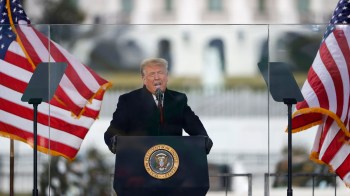Tess Vigeland: On Capitol Hill today, a financial drama. Let’s call it Uncle Sam versus Uncle Sachs. Top officials from the investment bank Goldman Sachs appeared at a Senate hearing and defended themselves against bipartisan fire over some of the trades Goldman was involved in leading up to the financial crisis. The hearing is unrelated to the SEC’s investigation of fraud at Goldman. But the topic was front and center anyway.
Marketplace’s Jeremy Hobson has been following the hearing. He joins us now. Hi Jeremy.
JEREMY HOBSON: Hi, Tess.
VIGELAND: So give us a little bit of a sense, a picture if you would, of what happened in today’s hearing.
HOBSON: Well you know, I watch a lot of these hearings on financial topics, and they can get pretty boring.
VIGELAND: Yes, they can.
HOBSON: This one was not. And not just because it included a lot of profanity, which we won’t play. But one of the participants, right out of Hollywood, fabulous fab Fabrice Tourre. He’s a 31-year-old Goldman trader. And he’s the one that’s accused of fraud by the SEC for his role in structuring securities for Goldman’s clients to invest in, securities that Goldman was betting against. Well he was asked whether he felt a duty to act in the best interest of Goldman’s clients.
Fabrice Tourre: I believe we have a duty to serve our clients, and with respect to our role as market maker, to show prices to our clients and to offer them liquidity. I do not believe we were acting as investment advisers for our clients.
HOBSON: So in other words, Tess, that Goldman is just providing a service by offering clients the ability to place bets on various things. That did not go over well with the senators. There was a lot frustration that their questions were not being answered satisfactorily, although it could have just been that they didn’t like the answers they were getting.
VIGELAND: Well, you know Jeremy, a lot of people are going to look at this as pure political theater. Do you think there’s anything wrong with that analysis?
HOBSON: Well, it’s a fair point, but keep in mind this is happening just as the Senate is prepared to enact sweeping financial reforms. I spoke with Boston University’s Securities Law Professor Elizabeth Nowicki. She says what’s happening today could actually have a real impact on the rules that govern Wall Street going forward.
Elizabeth Nowicki: Last time we saw massive financial reform was right after Enron imploded. It was a response to Enron. The Goldman employees, the Goldman lawyers, are well aware of this issue, and they certainly don’t want to give enough ammunition to Congress to justify Congress developing legislation that’s really going to significantly curb the business of Goldman Sachs.
HOBSON: And she’s talking specifically there about derivatives, and remember one of things Congress is considering doing in this financial reform packages is severely restricting the trading of derivatives, which is exactly what they were talking about today.
VIGELAND: Well, so, I guess the bottom line is whether this could actually influence the reform bill at this point, or is this just posturing?
HOBSON: It could. And keep in mind also that for the senators there’s nothing wrong with attacking Wall Street. There’s hardly an easier target to find, so having the ability to sit there for hours and attack bankers in front of the camera doesn’t hurt during an election year. Just to give you an example, Tess, of one of the more fun moments today, here’s an amusing cut from Senator John Ensign who represents the state of Nevada.
John Ensign: I think most people in Las Vegas would take offense at having Wall Street compared to Las Vegas because in Las Vegas actually people know that the odds are against them. They play anyway. On Wall Street, they manipulate the odds while you’re playing the game.
VIGELAND: Oh, snap. You know, Jeremy, I think we’re also seeing a bit of a culture clash here — Wall Street meets Washington. And that was really on evidence today, wasn’t it?
HOBSON: It was, and it’s difficult to say who was the home team and who was visiting because the senators control the time. But the issue is really something the Goldman guys are much more comfortable with talking about in detail. But there was one thing that struck me, which was the question of responsibility. These senators kept coming back to the issue, they would ask the Goldman guys: Don’t you feel that you have some responsibility to your clients, to shareholders, to the American public to think about the impact of the trades you’re doing? And they were basically saying, look this is business, I’m focused on what’s making money for my firm and for me. That didn’t sit too well with a bunch of elected representatives who actually do have to think about how things impact the entire economy and the American public.
VIGELAND: Marketplace’s Jeremy Hobson reviewing today’s hearing for us from his seat in New York. Thanks so much.
HOBSON: You’re welcome, Tess.
There’s a lot happening in the world. Through it all, Marketplace is here for you.
You rely on Marketplace to break down the world’s events and tell you how it affects you in a fact-based, approachable way. We rely on your financial support to keep making that possible.
Your donation today powers the independent journalism that you rely on. For just $5/month, you can help sustain Marketplace so we can keep reporting on the things that matter to you.


















